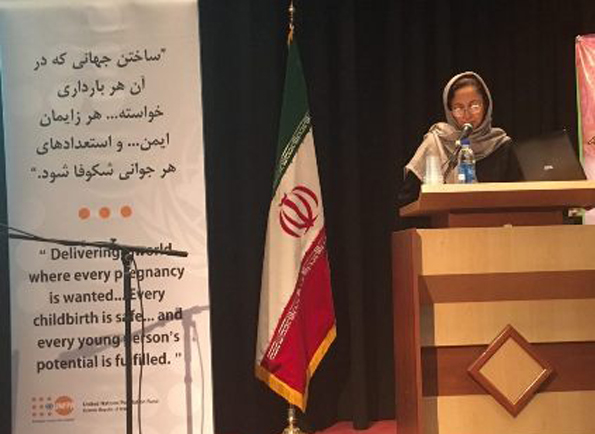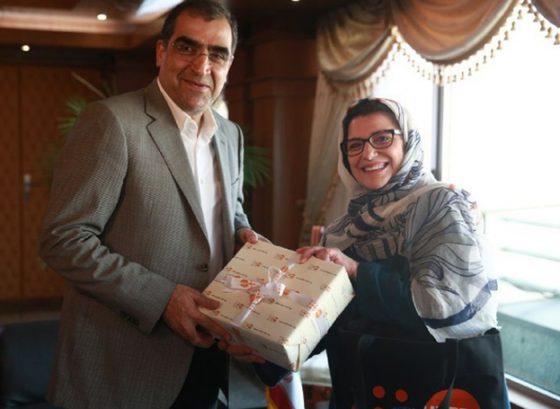UNFPA Representative’s Speech on the Occasion of International Day of Midwifery

Speech for the International Day of the Midwife 2016
Dr. Maha El Adawy, UNFPA Representative in the Islamic Republic of Iran, AVA Diplomatic reports.
4 May 2016
Excellencies, distinguished guests, ladies and gentlemen.
It is a great honor and pleasure to be here today to join you in celebrating the International Day of the Midwife.
First, I would like to take this opportunity to extend my appreciation to the office of His Excellency the Minister of Health and Medical Education and the special adviser on Midwifery for arranging this important gathering.
The International Day of the Midwife, 5 May, is a day to celebrate the life-saving work of the world’s midwives. Midwives are the primary care givers for millions of women and newborns before, during and after childbirth, and also offer women and girls essential counselling and education on reproductive health.
It has been proven over and over again that midwives play a key role in saving the lives of women and newborn. Women who receive continued care from midwives throughout pregnancy and birth are more likely to give birth to healthy babies and be healthy mothers. In midwifery-led care, emphasis is placed on normality, continuity of care and being cared for by a known, trusted midwife during labour.
Around the world, every year, nearly 40 million women give birth without skilled care, increasing the risk of death and disability for both the mother and newborn. Investments in midwives can help avert at least 30 per cent of the nearly 290,000 maternal deaths and three million newborn deaths that occur annually due to the lack of well-educated and regulated health workers and adequate facilities. These global figures stand in stark contrast to Iran, where 96.4% of deliveries are assisted by skilled attendants, reflecting the government’s commitment to the issue of maternal health. Iran is one of the few countries to have already achieved MDG 5, namely to reduce by three quarters the maternal mortality rate. Not only has Iran reached MDG 5 – it has also surpassed it, with an 83 percent drop in the MMR between 1990 and 2012. I want to congratulate you on this remarkable achievement.
I would also like to take this opportunity to commend Iran’s efforts in promoting natural delivery and reducing the number of unnecessary cesarean sections.
The Islamic Republic of Iran has a lot to offer and share with other countries. We are currently involved in an excellent example of South-South cooperation, UNFPA Iran, together with the Ministry of Health and Medical Education of Iran and in close cooperation with UNHCR, UNFPA Afghanistan and other key players, have started a project on “Improving Maternal Health in Afghanistan and for Afghan Refugees Living in Iran”. Among others, the project aims at strengthening midwifery services in Afghanistan using Iranian expertise, and training Afghan refugees in Iran on midwifery. This is just one example of South-South cooperation, and how we can share Iran’s expertise on safe motherhood with other countries in the region.
Celebrating the day of the midwife is very important to us in UNFPA. We put emphasis on the role of the midwife. Hence, on this occasion, UNFPA at its highest level puts an emphasis on this special celebration. Our Executive Director, Dr. Babatunde Osotimehin issues a statement, celebrating and appreciating the role of the midwife. I want to share it with you.
Midwives: health heroes for women, adolescent girls and newborns
“On this International Day of the Midwife, UNFPA, the United Nations Population Fund, salutes the contribution of midwives to saving the lives of women, adolescent girls and newborns, sometimes under very difficult circumstances, in hard-to-reach communities, in humanitarian emergencies, and in fragile and conflict-torn countries.
Well-trained and supported midwives working in communities are uniquely positioned to provide the compassionate, respectful and culturally sensitive care a woman needs during pregnancy and childbirth. Midwifery is equally important for newborns during the critical first month of life, and is a significant contribution to reproductive health in general.
Midwives are, therefore, essential to achieving the Sustainable Development Goals. In the past 25 years, the world has almost halved maternal deaths, but every year, some 300,000 women still die during pregnancy and childbirth, and almost 3 million babies do not survive their first four weeks of life. A vast majority of these largely preventable deaths take place in developing and crisis-affected countries. If deployed in larger numbers, trained midwives could avert approximately two thirds of these deaths. Significant investments in midwifery are essential if the world is to achieve its ambitious goals of reducing maternal and newborn deaths.
UNFPA is helping train and support thousands of midwives in more than 100 countries. A recent survey estimated that in 57 of these countries, UNFPA has trained 66,000 midwives over the past seven years. These critical health-care providers can help more than 11 million women to give birth safely each year, but much more needs to be done.
On this International Day of the Midwife, we at UNFPA renew our commitment to working with global partners and countries to strengthen midwifery skills and capacities. We call on countries to acclaim and reward midwives who are working in challenging and hard-to-reach areas, where their services are most needed. We also urge countries to invest in quality training, good working conditions, decent salaries, adequate workforce policies and possibilities for professional growth.
Midwives are our heroes and the backbone of reproductive health. Let us support them and the women and newborns at the heart of their care.”
UNFPA looks forward to continuing its work with Iranian government counterparts to support midwifery-led care, further improve reproductive health, and to share the successful experience of Iran with other countries.
Thank you.


